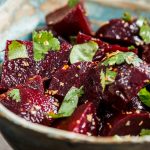5 life-changing reasons to start eating beets
 (NaturalHealth365) It’s fall, which means autumn-inspired recipes and fall foods are making their rounds throughout American kitchens. One of the most common types of food you’ll see this time of year are root vegetables, including yams, sweet potatoes, and a nutrient-rich favorite, beets.
(NaturalHealth365) It’s fall, which means autumn-inspired recipes and fall foods are making their rounds throughout American kitchens. One of the most common types of food you’ll see this time of year are root vegetables, including yams, sweet potatoes, and a nutrient-rich favorite, beets.
This root vegetable tends to be one of those either/or foods: people either love them or hate them. But, nutritional data reveals that this deep red (and sometimes purple, striped, white, or golden) vegetable can be a great addition to any healthy diet, especially if you find a delicious way to prepare them.
Keep reading to discover some of the best known health benefits of this popular vegetable.
Here are 5 GREAT reasons to add more beets to your diet
First things first: Don’t be alarmed if you see pink or red urine after eating beets! This harmless discoloration comes from the rich phytonutrients which give beets their deep color.
Despite this unusual effect, here are 5 reasons why it’s worth eating this root vegetable more often:
- They can help to lower blood pressure: A 2018 systematic review published in Biomolecules notes that consuming beets (in the form of beetroot juice) may help lower blood pressure. This incredible effect is due to the the nitrates found in beets, which (after being converted in the body to nitric oxide) are known to relax and dilate blood vessels.
- They contain powerful antioxidants: According to Consumer Reports, beets contain antioxidants such as betalains that protect against oxidative stress, a major cause of accelerated aging and inflammation.
- They provide nutrients without a lot of calories: Just one 3.5 ounce serving of cooked beets contains 2 grams of fiber and 1.7 grams of plant protein but only 44 calories. The fiber contributes to the feeling of fullness which may promote decreased caloric intake and weight loss. Beets also contain 20% of the reference daily intake (RDI) of folate, 9% of the RDI for potassium, 6% of the RDI for magnesium, and 4% of the RDI for iron.
- They can help to enhance athletic performance: Dozens of studies have found that consuming beets (typically in the form of beetroot juice) can boost athletic performance, enhance endurance, and reduce muscle fatigue thanks to the way nitrates increase blood flow and boost the function of mitochondria, the so-called “powerhouses of the cell.”
- They support cognition by promoting blood flow to the brain: A 2011 paper published in Nitric Oxide suggests that consuming beets may boost mental function by increasing blood flow to certain areas of the brain, including the frontal lobe which is involved in higher-order tasks like memory and decision-making.
So, with all these known benefits, one question you may have is: Should everyone eat beets? (We think so…)
Discover a Simple and Effective Way to Remove Toxins: This is Jonathan's #1 choice for at-home detoxification. Special offer ends Feb. 16.
But, there are some health “experts” that express concern about the oxalates – which may promote kidney stones in people prone to getting them. And, while oxalates are known to interrupt the absorption of certain micronutrients. This “concern” may be a bit hyped up.
And, that’s because the concentration of oxalates in beets is much greater in the leaves than in the roots. So, when juicing the root portion … it’s not really an issue.
In addition, beets contain short chain carbohydrates known collectively as “fermentable, oligo-, di-, mono-saccharides and polyols,” or FODMAPs. In some people, such as individuals with irritable bowel syndrome, FODMAPs can lead to digestive upset.
That being said, most people tolerate beets (and beet juice) very well – so don’t be afraid to invite them into your kitchen! Naturally, if you’re very concerned … be sure to consult an experience natural food expert for guidance.
Need some inspiration? Try these 3 delicious ideas
A lot of the studies done on beets involve beets in powder or juice form. By eating beets in their whole form, however, you’ll get all the nutrients plus the gut-healthy and filling fiber.
Here are three simple ways to add them into your diet, this fall:
- Thinly sliced raw and sprinkled with salt and lemon – eat on their own or try in a salad or sandwich
- Pickled
- Roasted until tender, drizzled with olive oil and local honey, and sprinkled with toasted hazelnuts
Sources for this article include:
Nutritiondata.self.com
Garden.org
NIH.gov
NIH.gov
NIH.gov
IBSdiets.org



